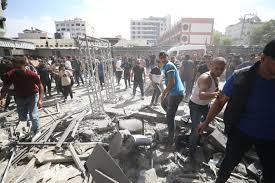In a bold move that underscores growing international tensions surrounding the Gaza conflict, Nicaragua has announced the severing of diplomatic ties with Israel. This decision, while largely symbolic, reflects the increasing global scrutiny of Israel’s actions in Gaza and the broader Middle East. The breaking of diplomatic ties by Nicaragua adds another layer to the complex web of international relations surrounding the ongoing conflict, highlighting the ripple effects of the war beyond its immediate geographical confines.
The Ortega Government’s Stance
Nicaragua’s decision to cut diplomatic ties with Israel came after a resolution passed by the country’s Congress, marking the one-year anniversary of the Gaza war. Vice President Rosario Murillo, wife of President Daniel Ortega, made the announcement to state media, using strong language to condemn Israel’s government as “fascist” and “genocidal.” This rhetoric reflects the Nicaraguan government’s unequivocal opposition to Israel’s military campaign in Gaza and its expanding operations in the region.
The move, while dramatic in its wording, is largely symbolic in practical terms. Israel does not maintain a resident ambassador in Nicaragua’s capital, Managua, and relations between the two nations have been minimal for years. However, the significance of this action lies in its timing and the message it sends to the international community about Nicaragua’s stance on the conflict.
Growing Latin American Opposition to Israel’s Actions
Nicaragua’s decision aligns with a broader trend of opposition to Israel’s Gaza campaign among Latin American nations. Countries such as Brazil, Colombia, and Chile have emerged as vocal critics of Israel’s actions. This regional sentiment was further exemplified when these nations spearheaded a letter of support for UN Secretary-General Antonio Guterres, whom Israel had declared persona non grata.
The growing opposition in Latin America has manifested in various forms:
1. Colombia’s President Gustavo Petro cut diplomatic ties with Israel in May, explicitly calling the Netanyahu administration “genocidal.”
2. Brazilian leader Luiz Inacio Lula da Silva recalled his country’s ambassador to Israel and likened the war in Gaza to the Holocaust.
3. Nicaragua itself attempted to halt German arms sales to Israel through a request to the International Court of Justice (ICJ), though this effort was rejected in April.
This regional trend reflects a shift in diplomatic stances and highlights the increasing isolation Israel faces on the international stage due to its actions in Gaza.
Diplomatic Ties: The Broader Context of the Gaza Conflict
The breaking of diplomatic ties by Nicaragua comes at a critical juncture in the Gaza conflict. The death toll in Gaza has exceeded 42,000, with thousands more killed in Lebanon due to Israel’s expanding military operations. This escalation of violence has led to increased international scrutiny and calls for diplomatic action.
The conflict’s impact extends beyond Gaza, with fighting now threatening Lebanon and potentially escalating tensions with Syria, Yemen, and Iran. This widening scope of the conflict has intensified global concerns and diplomatic efforts to address the situation.
Nicaragua’s action, while a small piece in the larger puzzle, contributes to the mounting diplomatic pressure on Israel. It represents a growing trend of nations taking concrete steps to express their disapproval of Israel’s military actions, potentially influencing the broader international discourse on the conflict.
Nicaragua’s Own Diplomatic Challenges
While Nicaragua takes a strong stance against Israel, it’s worth noting that the country faces its own diplomatic challenges within Latin America. The Ortega government has been criticized for its repressive actions against dissidents and political opponents, leading to growing isolation in the region.
This context adds a layer of complexity to Nicaragua’s decision. While the move aligns with a broader Latin American trend of opposing Israel’s actions in Gaza, it also comes from a government facing its own controversies and diplomatic tensions. This juxtaposition highlights the intricate nature of international relations and the multiple factors that can influence a country’s foreign policy decisions.
Nicaragua’s decision to break diplomatic ties with Israel marks a significant moment in the ongoing global response to the Gaza conflict. While largely symbolic, this move reflects the growing international concern over Israel’s military actions and their far-reaching consequences. As more countries, particularly in Latin America, take strong stances against Israel’s campaign in Gaza, the diplomatic landscape surrounding the conflict continues to evolve. The severing of diplomatic ties by Nicaragua, along with similar actions by other nations, may contribute to increasing pressure on Israel to reconsider its approach to the conflict and engage in meaningful dialogue towards a peaceful resolution. As the situation in Gaza and the broader Middle East remains volatile, the international community’s diplomatic responses will play a crucial role in shaping the path forward.
Related News
















